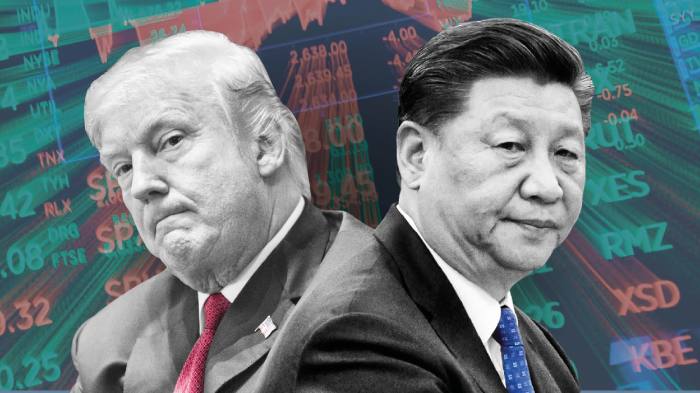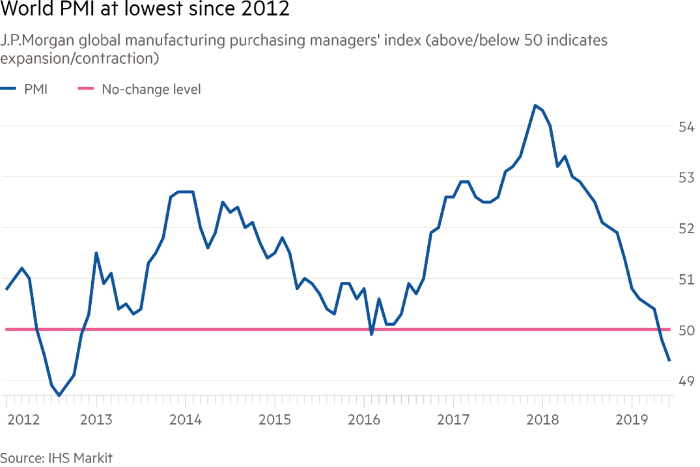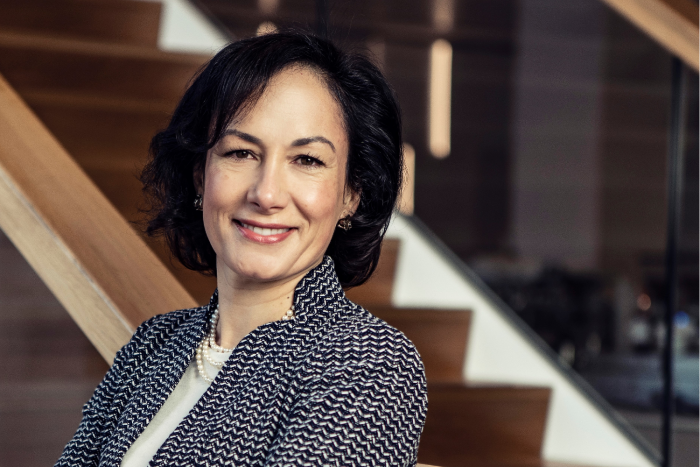- Beranda
- Komunitas
- News
- Berita Luar Negeri
World gets Twitter jitters at Trump’s ‘no hurry’ on US-China deal
TS
.haiyaa
World gets Twitter jitters at Trump’s ‘no hurry’ on US-China deal
World gets Twitter jitters at Trump’s ‘no hurry’ on US-China deal

Trump and Xi: it is thought likely that tension will continue even if there is a deal © FT montage by Kari Pedersen
As Donald Trump and Chinese president Xi Jinping announced a trade war truce at the G20 meeting in Japan, the US president took to Twitter.
The pair had agreed to resume negotiations after an “excellent” meeting, Mr Trump said.
Then he added: “The quality of the transaction is far more important to me than speed.
I am in no hurry, but things look very good!”
The news, which came after trade talks collapsed in May, was welcomed worldwide and US, Asian and European markets rallied.
Two weeks on, however, Mr Trump’s “no hurry” statement has left many investors feeling jittery.
At a time when markets are at a record high but business confidence is muted, fund managers struggle with how to position portfolios.
Without a deal, there is worry over the outlook for corporate earnings and global growth.
Paul O’Connor, head of the UK-based multi-asset team at Janus Henderson, the Anglo-American fund manager, says the outcome of the meeting in Japan avoided some of the “more adverse outcomes”, such as an escalation of tariffs.
He adds, however: “It was a ceasefire, not even a truce. If you look at what was agreed at the meeting, there was very little detail.
“It’s hard to know how long that will last.”
The trade disagreement has been brewing for years, with Mr Trump complaining about Chinese trade practices even before winning the US election in 2016.
After investigating Chinese trade policies, the US last year imposed tariffs on billions of dollars worth of Chinese goods. China retaliated with its own tariffs.
A truce was declared in December, only for talks to collapse this spring.
The US then said it would raise tariffs on some Chinese products to 25 per cent from 10 per cent and said it planned additional measures.
China, meanwhile, hit US goods with moretariffs.
Business sentiment suffered as the dispute escalated. In June, a global manufacturing index produced by JPMorgan and IHS Markit fell to its lowest level since 2012, with new order levels sharply weaker and business optimism at a record low. The monthly reading of 49.4, down from 49.8 in May, indicated that most firms had reported falling output.

“The uncertainty around trade is weighing very heavy on business confidence,” says Mr O’Connor. He points out that many businesses are unwilling to invest in capital expenditure until there is clarity over trading.
Michael Grady, head of investment strategy and chief economist at Aviva Investors, the £337bn fund house, says the outlook for global growth has deteriorated in the past three months, largely due to trade tension, which has hurt sentiment.
At the same time, he suggests there is cross-party consensus in the US over protecting its corporate and national interests, meaning that the issue could linger on.
“It makes things pretty fraught in terms of thinking about managing portfolios in that kind of environment,” says Mr Grady.
Fund managers have repeatedly cited trade wars as a big risk to markets.
Last month, 56 per cent of investors surveyed said trade wars were the largest tail risk to the market, up 19 percentage points from May and topping the list for 14 of the past 16 months, according to the Bank of America survey of fund managers.

Fabiana Fedeli of Robeco: If we don’t have a deal by the end of the year it will be after the US presidential elections
Whether there will be a deal or not is the multibillion-dollar question on the lips of fund managers.
David Riley, chief investment strategist at BlueBay Asset Management, the active fixed income manager, thinks there will be “some kind of resolution or deal on the trade side” between China and the US, but that tension will continue.
Fabiana Fedeli, global head of fundamental equities at Robeco, the €179bn fund manager, believes a trade agreement will happen but it will take longer than expected and involve “a lot of back and forth”.
She adds that markets have been complacent in the weeks since the Trump-Xi meeting but with negotiations likely to drag, “we are expecting volatility”.
“If you don’t get an agreement, you will get a lot of trade disputation: that will disrupt earnings of US and emerging market companies. There is going to be a risk-off scenario [if that happens],” she says, adding that no market would do well in such an instance but the US would outperform the rest of the world.
The US presidential election next year is also on investors’ minds. Ms Fedeli says: “Our base case scenario is that we will have [a deal] before the end of the year. But if we don’t have it by then, it will be after the US presidential elections.
No one wants to do negotiations during the campaign. And that would be a big negative for markets.”
Larry Lau, portfolio manager at Trium Capital, adds that Mr Trump is considering his next move on trade with an eye on the election. “He doesn’t want to give an impression that he is relaxing on this.
Or ...to be overly antagonistic. He is trying to do enough that trade isn’t going to be a huge issue for the campaign.”
Without a substantial deal, though, some fund managers fear business sentiment will remain weak, as will capital expenditure. Aviva has downgraded its equities position to neutral, preferring credit in risk assets.
Janus Henderson’s Mr O’Connor says the concern over trade is “yet another reason to be more cautious of export-orientated markets”, such as Japan, the eurozone and emerging markets. “It encourages us to have a higher weighting in bonds and gold,” he adds.
Others are more optimistic.
Guy Monson, CIO at Sarasin and Partners, a British asset manager, says as well as equity markets reacting to the trade dispute, central bankers are watching the situation. There is a rising expectation of interest rate cuts from several central banks.
“[The trade dispute] has had an extraordinary degree of impact, when you consider that outside the auto and manufacturing sectors, the rest of the economy looks good,” he says.
“The net result is to provide a potentially powerful cocktail. There is enough fear for central bankers to spook them and drive down interest rates but not enough to do damage to dividends and profits.”
Sarasin is overweight in equities and risk assets. “We get enough noise, tweets and global uncertainty to encourage central bankers to loosen, but not enough to damage equity outlook and that sets you up for a powerful equity rally.
That can’t go on for ever but in the present we are in a sweet spot for equities.”
John Praveen, senior portfolio manager at QMA, the quantitative investment house, says: “A positive scenario for risky assets could involve a trade truce ahead of the presidential election year, along with continued central bank dovishness and more China stimulus.
”
For now fund managers are watching the talks — and Mr Trump’s tweets — closely. But even if the US and China agree a deal, many fear that wider trade disputes will continue while politicians use tariffs as a political tool.
Japan recently imposed trade restrictions on South Korea, while automakers in Europe also fear being hit with tariffs. Mr Trump previously suggested that tariffs could be imposed on Mexico if it did not reduce the number of illegal immigrants trying to cross the US border.
“As long as we don’t get an escalation of trade tariffs or auto tariffs, I think the market as a whole will be relatively sanguine,” says Mr Riley. “But I don’t think the market is well prepared if there were to be additional tariffs.”
US relaxes rules on Huawei but keeps it on the ‘entity list’
When trade talks broke down in May, Chinese technology company Huawei became a casualty. The White House and US Department of Commerce took steps that would in effect ban Huawei from selling technology into the American market, and also prevent it from buying semiconductors crucial for its production from US suppliers.
After the G20, the Trump administration significantly relaxed restrictions on US companies selling to Huawei but Wilbur Ross, the commerce secretary, said on Wednesday that Huawei would not be removed from the so-called entity list and that companies would still need a licence.
Sarasin’s Mr Monson says: “There is a trade dispute going on and a potential technology dispute going on. The jockey[ing] for trade and tech dominance will be with us for a long time.”
haiyaaa ciilaaka luuwa weelas waaa
Opa Trump Art of Deal,tarik ulur waaa!!??
Kire2 nyeee siyaape bkln yg kejet2 dulu haaa!!???

Trump and Xi: it is thought likely that tension will continue even if there is a deal © FT montage by Kari Pedersen
As Donald Trump and Chinese president Xi Jinping announced a trade war truce at the G20 meeting in Japan, the US president took to Twitter.
The pair had agreed to resume negotiations after an “excellent” meeting, Mr Trump said.
Then he added: “The quality of the transaction is far more important to me than speed.
I am in no hurry, but things look very good!”
The news, which came after trade talks collapsed in May, was welcomed worldwide and US, Asian and European markets rallied.
Two weeks on, however, Mr Trump’s “no hurry” statement has left many investors feeling jittery.
At a time when markets are at a record high but business confidence is muted, fund managers struggle with how to position portfolios.
Without a deal, there is worry over the outlook for corporate earnings and global growth.
Paul O’Connor, head of the UK-based multi-asset team at Janus Henderson, the Anglo-American fund manager, says the outcome of the meeting in Japan avoided some of the “more adverse outcomes”, such as an escalation of tariffs.
He adds, however: “It was a ceasefire, not even a truce. If you look at what was agreed at the meeting, there was very little detail.
“It’s hard to know how long that will last.”
The trade disagreement has been brewing for years, with Mr Trump complaining about Chinese trade practices even before winning the US election in 2016.
After investigating Chinese trade policies, the US last year imposed tariffs on billions of dollars worth of Chinese goods. China retaliated with its own tariffs.
A truce was declared in December, only for talks to collapse this spring.
The US then said it would raise tariffs on some Chinese products to 25 per cent from 10 per cent and said it planned additional measures.
China, meanwhile, hit US goods with moretariffs.
Business sentiment suffered as the dispute escalated. In June, a global manufacturing index produced by JPMorgan and IHS Markit fell to its lowest level since 2012, with new order levels sharply weaker and business optimism at a record low. The monthly reading of 49.4, down from 49.8 in May, indicated that most firms had reported falling output.

“The uncertainty around trade is weighing very heavy on business confidence,” says Mr O’Connor. He points out that many businesses are unwilling to invest in capital expenditure until there is clarity over trading.
Michael Grady, head of investment strategy and chief economist at Aviva Investors, the £337bn fund house, says the outlook for global growth has deteriorated in the past three months, largely due to trade tension, which has hurt sentiment.
At the same time, he suggests there is cross-party consensus in the US over protecting its corporate and national interests, meaning that the issue could linger on.
“It makes things pretty fraught in terms of thinking about managing portfolios in that kind of environment,” says Mr Grady.
Fund managers have repeatedly cited trade wars as a big risk to markets.
Last month, 56 per cent of investors surveyed said trade wars were the largest tail risk to the market, up 19 percentage points from May and topping the list for 14 of the past 16 months, according to the Bank of America survey of fund managers.

Fabiana Fedeli of Robeco: If we don’t have a deal by the end of the year it will be after the US presidential elections
Whether there will be a deal or not is the multibillion-dollar question on the lips of fund managers.
David Riley, chief investment strategist at BlueBay Asset Management, the active fixed income manager, thinks there will be “some kind of resolution or deal on the trade side” between China and the US, but that tension will continue.
Fabiana Fedeli, global head of fundamental equities at Robeco, the €179bn fund manager, believes a trade agreement will happen but it will take longer than expected and involve “a lot of back and forth”.
She adds that markets have been complacent in the weeks since the Trump-Xi meeting but with negotiations likely to drag, “we are expecting volatility”.
“If you don’t get an agreement, you will get a lot of trade disputation: that will disrupt earnings of US and emerging market companies. There is going to be a risk-off scenario [if that happens],” she says, adding that no market would do well in such an instance but the US would outperform the rest of the world.
The US presidential election next year is also on investors’ minds. Ms Fedeli says: “Our base case scenario is that we will have [a deal] before the end of the year. But if we don’t have it by then, it will be after the US presidential elections.
No one wants to do negotiations during the campaign. And that would be a big negative for markets.”
Larry Lau, portfolio manager at Trium Capital, adds that Mr Trump is considering his next move on trade with an eye on the election. “He doesn’t want to give an impression that he is relaxing on this.
Or ...to be overly antagonistic. He is trying to do enough that trade isn’t going to be a huge issue for the campaign.”
Without a substantial deal, though, some fund managers fear business sentiment will remain weak, as will capital expenditure. Aviva has downgraded its equities position to neutral, preferring credit in risk assets.
Janus Henderson’s Mr O’Connor says the concern over trade is “yet another reason to be more cautious of export-orientated markets”, such as Japan, the eurozone and emerging markets. “It encourages us to have a higher weighting in bonds and gold,” he adds.
Others are more optimistic.
Guy Monson, CIO at Sarasin and Partners, a British asset manager, says as well as equity markets reacting to the trade dispute, central bankers are watching the situation. There is a rising expectation of interest rate cuts from several central banks.
“[The trade dispute] has had an extraordinary degree of impact, when you consider that outside the auto and manufacturing sectors, the rest of the economy looks good,” he says.
“The net result is to provide a potentially powerful cocktail. There is enough fear for central bankers to spook them and drive down interest rates but not enough to do damage to dividends and profits.”
Sarasin is overweight in equities and risk assets. “We get enough noise, tweets and global uncertainty to encourage central bankers to loosen, but not enough to damage equity outlook and that sets you up for a powerful equity rally.
That can’t go on for ever but in the present we are in a sweet spot for equities.”
John Praveen, senior portfolio manager at QMA, the quantitative investment house, says: “A positive scenario for risky assets could involve a trade truce ahead of the presidential election year, along with continued central bank dovishness and more China stimulus.
”
For now fund managers are watching the talks — and Mr Trump’s tweets — closely. But even if the US and China agree a deal, many fear that wider trade disputes will continue while politicians use tariffs as a political tool.
Japan recently imposed trade restrictions on South Korea, while automakers in Europe also fear being hit with tariffs. Mr Trump previously suggested that tariffs could be imposed on Mexico if it did not reduce the number of illegal immigrants trying to cross the US border.
“As long as we don’t get an escalation of trade tariffs or auto tariffs, I think the market as a whole will be relatively sanguine,” says Mr Riley. “But I don’t think the market is well prepared if there were to be additional tariffs.”
US relaxes rules on Huawei but keeps it on the ‘entity list’
When trade talks broke down in May, Chinese technology company Huawei became a casualty. The White House and US Department of Commerce took steps that would in effect ban Huawei from selling technology into the American market, and also prevent it from buying semiconductors crucial for its production from US suppliers.
After the G20, the Trump administration significantly relaxed restrictions on US companies selling to Huawei but Wilbur Ross, the commerce secretary, said on Wednesday that Huawei would not be removed from the so-called entity list and that companies would still need a licence.
Sarasin’s Mr Monson says: “There is a trade dispute going on and a potential technology dispute going on. The jockey[ing] for trade and tech dominance will be with us for a long time.”
haiyaaa ciilaaka luuwa weelas waaa
Opa Trump Art of Deal,tarik ulur waaa!!??
Kire2 nyeee siyaape bkln yg kejet2 dulu haaa!!???

anasabila dan 2 lainnya memberi reputasi
3
886
5
Komentar yang asik ya
Urutan
Terbaru
Terlama
Komentar yang asik ya
Komunitas Pilihan